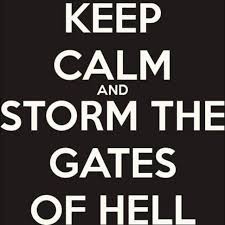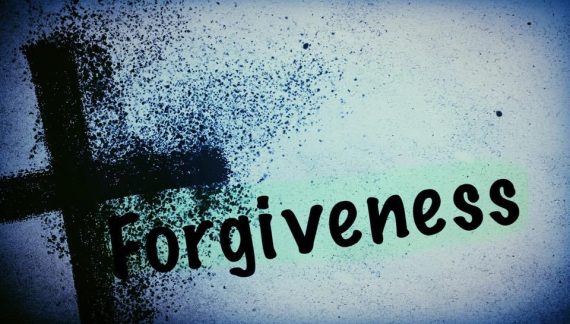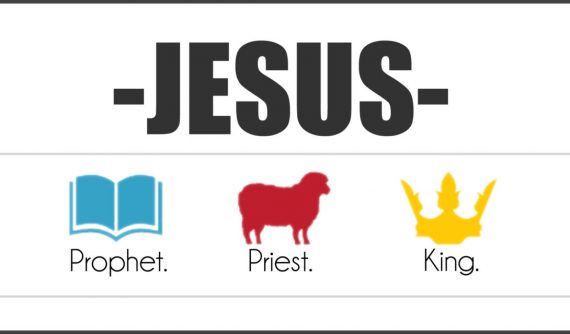No, I am not condemning or cursing Christians to hell. Instead, I am inviting them to follow Jesus wherever He leads … even when it is straight to hell. In other words, I am saying that Jesus is leading you to go to hell.
Let me explain.
The Gates of Hell Will Not Prevail Against It
In my book, (#AmazonAdLink) The Death and Resurrection of the Church, I point out that the very first time Jesus talked about the church, He said that He was going to build it and that that gates of hell would not prevail against it (Matthew 16:18).
 When most Christians read this, they imagine the church as this impregnable fortress, with huge white granite walls, behind which all the people of God huddle together in safety as the forces of evil attack from outside.
When most Christians read this, they imagine the church as this impregnable fortress, with huge white granite walls, behind which all the people of God huddle together in safety as the forces of evil attack from outside.
When most Christians read Matthew 16:18, they think Jesus is saying that the church He is building will be a place for Christians to safely wait out the onslaught of the invading hordes of hell.
But this is exactly the opposite of what Jesus says. In Matthew 16:18 Jesus says that the gates of hell will not prevail against the church. Do you see? Jesus is saying that the church He is building will go to hell and storm the gates of hell.
In other words, who has the gates and walls which keep out the invading army? Not the church, but hell.
And therefore, who is the invading army? Not hell, but the church.
When Jesus describes the church He is building, it is not the church which has the walls and gates, but hell. And it is not the devil and his forces that are attacking the gates of the church, but the church which is attacking the gates of hell. It is the church which will go to hell to rescue those who are there.
The gates of hell are under siege by Jesus and His church.
 It is not the church that is attempting to hide behind gleaming walls as against an invading army. No, it is Satan and his minions who are huddled behind their blackened walls, hoping that the gates will hold.
It is not the church that is attempting to hide behind gleaming walls as against an invading army. No, it is Satan and his minions who are huddled behind their blackened walls, hoping that the gates will hold.
Jesus says they will not. Jesus says the gates of hell will not prevail. They will not stand. The gates of hell will fall to the invading church.
Of course, this presupposes that the church is on the offensive. That the church is invading hell. That the church has followed Jesus to hell. That the church will go to hell with Jesus.
It’s an exciting prospect!
But there is something else in Jesus’ statement as well.
Where is Hell? It is Here and Now
If the church is here in this world, and if Jesus is leading the church to attack the gates of hell now… then this means that hell is here and now as well.
It has been said that the greatest trick the devil ever pulled was convincing the world he didn’t exist. If that’s true, the second greatest trick the devil ever pulled was convincing the church that hell existed only in the afterlife, and only for unbelievers.
The truth, as indicated by Jesus Himself in Matthew 16, is that hell is here and now. Hell is a kingdom on this earth, and Jesus launched His attack on the gates of hell by inaugurating the kingdom of God on earth. We are now in the middle of a struggle between two kingdoms, and Jesus has shown us that the gates of hell will crumble and fall so that His rule and reign will cover the earth, until every knee bows and every tongue confesses that Jesus Christ is Lord (Rom 14:11; Php 2:10).
If the church is going to go to hell with Jesus, then this means that the gates of hell must exist here and now, on this earth, during our lives, so that we can go to hell and attack the gates.
In his excellent article, “Hell is a Kingdom,” Brad Jersak writes this:
“Hell is a kingdom, located wherever people are imprisoned and oppressed by the ‘the powers’ and death-dealers of ‘this present darkness’—whether it’s the military-industrial-complex, corporate or political beasts, or any personal affliction, addiction or obsession of choice. … Jesus is not calling the death-snares of this world hades metaphorically in anticipation of the actual subterranean post-mortem hades. Just the opposite: the afterlife mythology of hades is a metaphor for the actual human condition ‘here above.’ The rhetoric or hell is less about the eschatological future and more about educating us in the ‘two ways’ or ‘two kingdoms’ competing for our allegiance here on earth.” (Sinner Irenaeus, aka Brad Jersak, “Hell is a Kingdom: The Missing Motif Reconstructed,” 6).
The message of the kingdom of God as taught by Jesus must be read in light of the idea that hell as a present reality.
It is to the humans caught in the kingdom of hell that Jesus said, “The Kingdom of God is at hand” (Matt 4:17) This is not a promise to claim as we wait to die so we can go to heaven and spend an eternal bliss with God. This is a war cry. It is the declaration of Jesus the thief, entering into the strongman’s house, to tie him up and steal his possessions. What possessions? This world and the human beings upon it (Matt 12:29).
So the Church Should Go to Hell
 The terrible, tragic reality is that while the church gets so caught up in the debate about who goes to hell, and how long they will be there, and whether or not hell is a place of eternal suffering or temporary purification, we are ignoring the people living in hell on earth all around us.
The terrible, tragic reality is that while the church gets so caught up in the debate about who goes to hell, and how long they will be there, and whether or not hell is a place of eternal suffering or temporary purification, we are ignoring the people living in hell on earth all around us.
The debate about hell keeps us from helping those who are suffering in the kingdom of hell here and now. Isn’t that sadly ironic? We strengthen and enable hell by discussing and debating hell.
So where do you see the gates of hell in the lives of your family members? Where do you see the influence and power of hell in your neighborhood? Where do you see hell in your town or city? How can you go to hell by rescuing and delivering them?
Where do you see people living in addiction, bondage, guilt, shame, and fear? Where are they abused, maligned, neglected, forgotten, overlooked, abandoned, and forsaken? Where are they sold? Where are they starving? Where are they seeking love?
Wherever you see such things, you see the gates of hell.

What is the plan of attack to charge these gates and tear them down? With Jesus at your side, these gates will not prevail against you.
There are two kingdoms at war in this world, the kingdom of heaven and the kingdom of hell. Jesus is calling you to participate in one by storming the gates of the other.
Will you answer the call of Jesus and go to hell with Him?
This post is part of the May Synchroblog, in which numerous bloggers around the world write about the same topic on the same day. Links to the other contributors are below. Go and read what they have to say about the topic of hell.
- An Investigation into the Biblical Concept of Hell – Justin Steckbauer
- To Hell and Back – Soulcare Ministries
- The HELL You Say! – Nathan Jennings
- Forbidden Fruit = Hell’s Flames – Michael Wilson
- How long does hell last? – K.W. Leslie
- The problem of those unable to Love, or the question of hell as a reality – Bram Cools
- Hell No! – Mike Edwards
- Five Misconceptions about Annihilationism – Wesley Rostoll
- Knowing Who You Trust – Tim Nichols
- Heretic (Belated) Fridays – Bradley Jersak – Her Gates Will Never Be Shut– Scott Sloan
- Hell – A Place of Passionate Desire – Alan Stevens
- Oh, Hell, NO! – Liz Dyer




 The bottom line truth we will learn is that a public confession of Jesus is not required to receive (or prove that we have) eternal life. Not even Romans 10:9-10 teaches this idea.
The bottom line truth we will learn is that a public confession of Jesus is not required to receive (or prove that we have) eternal life. Not even Romans 10:9-10 teaches this idea.

 Many use Romans 10:9-10 to teach that if a person is going to truly be a Christian, they are required to make a public confession of faith in front of other people.
Many use Romans 10:9-10 to teach that if a person is going to truly be a Christian, they are required to make a public confession of faith in front of other people.



 So what did the Apostle John mean when he wrote 1 John 1:9? To understand this verse, we need to understand three things. We need to understand the meaning of the word “confess,” the meaning of the word “forgive” and the overall message and theme of 1 John.
So what did the Apostle John mean when he wrote 1 John 1:9? To understand this verse, we need to understand three things. We need to understand the meaning of the word “confess,” the meaning of the word “forgive” and the overall message and theme of 1 John.

 You can have a relationship with somebody, but not fellowship. For example, if you had a fight with one of your parents several years back, you are still related to them and are still part of the family, but you might not call them on the phone or get together for holidays. You are related, but do not have fellowship. You are not abiding or remaining with them in an ongoing friendship.
You can have a relationship with somebody, but not fellowship. For example, if you had a fight with one of your parents several years back, you are still related to them and are still part of the family, but you might not call them on the phone or get together for holidays. You are related, but do not have fellowship. You are not abiding or remaining with them in an ongoing friendship. The first step in healing this brokenness is by confessing our sin and agreeing with God that what we did was wrong.
The first step in healing this brokenness is by confessing our sin and agreeing with God that what we did was wrong.
 The word
The word 

 So when we read about Jesus Christ in the Bible, or when we read about how Christians are in Christ, it is important to not over-spiritualize word Christ, but instead to recognize that a statement is being bad about the Lordship and Mastery of Jesus over all things.
So when we read about Jesus Christ in the Bible, or when we read about how Christians are in Christ, it is important to not over-spiritualize word Christ, but instead to recognize that a statement is being bad about the Lordship and Mastery of Jesus over all things. However, John did not write this Gospel account only for unbelievers. While he emphasizes over and over how a person can believe in Jesus for eternal life, John also knows that God wants much more for us than to just believe in Jesus.
However, John did not write this Gospel account only for unbelievers. While he emphasizes over and over how a person can believe in Jesus for eternal life, John also knows that God wants much more for us than to just believe in Jesus.
 The Book of Life is a translation from the Greek phrase tō biblō tēs zōēs. The phrase “the Book of Life” or “the Book of the Living” are fine translations for this phrase.
The Book of Life is a translation from the Greek phrase tō biblō tēs zōēs. The phrase “the Book of Life” or “the Book of the Living” are fine translations for this phrase. Whichever approach you choose, it is important to note that while Scripture does teach about getting blotted out of the Book of Life, this does not ever refer to losing eternal life. While a person might get their “penciled” name erased from the Book of Life when they die, once a person’s name is written in permanent ink, it cannot ever be blotted out.
Whichever approach you choose, it is important to note that while Scripture does teach about getting blotted out of the Book of Life, this does not ever refer to losing eternal life. While a person might get their “penciled” name erased from the Book of Life when they die, once a person’s name is written in permanent ink, it cannot ever be blotted out. He says he will come like a thief in the night (Rev 3:3), but this does not mean that He will come to kill them or take away their eternal life. Jesus says that unfaithful servants will not be honored the same way that faithful servants will be, but He is not saying that unfaithful servants will be cast out, killed, or have eternal life removed from them.
He says he will come like a thief in the night (Rev 3:3), but this does not mean that He will come to kill them or take away their eternal life. Jesus says that unfaithful servants will not be honored the same way that faithful servants will be, but He is not saying that unfaithful servants will be cast out, killed, or have eternal life removed from them.